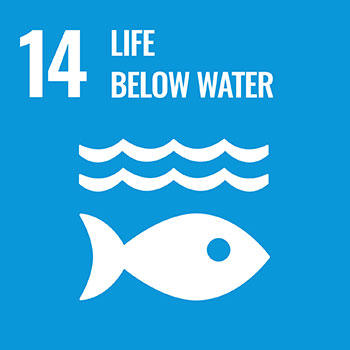SDG 14: Life Below Water
Conserve and sustainably use the oceans, seas and marine resources for sustainable development.

Laurier is a leader in water research and academic programing. In alignment with SDG 14, we actively engage in work to protect aquatic ecosystems from human activity and climate change related impacts.
See some of the work that Laurier completed in 2022 to advance SDG 14.
Laurier appointed Heidi Swanson as the inaugural Jarislowsky Chairholder in Sustainable Water Futures. The endowed research chair was established through a transformational $2-million gift from the Jarislowsky Foundation – matched by Laurier, for a cumulative $4-million endowment – and will focus on sustainable resource management and adaptation to climate change.
Jim McGeer, a professor of Biology at Laurier, is leading a three-year study at the Nechalacho mine in the Northwest Territories, Canada’s first producer of rare earth elements. Commissioned by the mine’s owners, Cheetah Resources, his team is investigating the elements’ potential effects on the aquatic environment. Mining activities can increase levels of rare earths naturally found in water, and it’s still unclear how much is too much.
Explore the work that Laurier research centres do to protect water and marine resources.
The Laurier Institute for Water Science is a multidisciplinary, collaborative undertaking among research faculty in the Faculty of Arts, the Lazaridis School of Business and Economics and the Faculty of Science. The focus of the institute is on research in three interconnected water-related disciplines: hydrological sciences, ecology and biogeochemical sciences, and public policy and management.
The Cold Regions Research Centre is focused on cold regions research, consulting on topics such as hydrology, climatology, glaciology, resource management, parks planning and biogeochemistry.
Learn more about Laurier initiatives in 2022 that helped advance SDG 14.
Since 2010, Laurier has maintained a unique and productive research partnership with the Government of the Northwest Territories (GNWT). The partnership, which has been expanded and extended to 2030, has brought new research expertise and training opportunities to the Northwest Territories and strong community connections and research opportunities to Laurier scholars. Much of the work through Laurier's partnership with the GNWT addresses the SDGs. Close connections between academic researchers and governments enhance policy development related to the SDGs and improve the capacity of governments to engage in adaptive management.
The Aquatic Science Outreach Network for the Grand River (AquaSONG) is an NSERC-funded program coordinated by Laurier and the Centre for Cold Regions and Water Science. The primary purpose of this field trip is to inform and educate local high school students on the fragility of this local water body, encourage creative collaboration in a laboratory setting, teach basic field sampling techniques and demonstrate methods of analysis. The experience is centred around the concepts of wastewater treatment and analysis, and freshwater aquatic biology.
Laurier is a core partner in Global Water Futures (GWF), a pan-Canadian research program that is funded in part by a $77.8-million grant from the Canada First Research Excellence Fund. The overarching goal of the program is to deliver risk management solutions – informed by leading-edge water science and supported by innovative decision-making tools – to manage water futures in Canada and other cold regions where global warming is changing landscapes, ecosystems and the water environment. GWF aims to position Canada as a global leader in water science for cold regions and will address the strategic needs of the Canadian economy in adapting to change and managing risks of uncertain water futures and extreme events.
Northern Water Futures is a consortium of knowledge producers, mobilizers and users from communities, government, industry, non-governmental organizations and universities, working collaboratively to understand, predict and address the impacts of climate change and industrial expansion on shared water resources across the Northwest Territories.